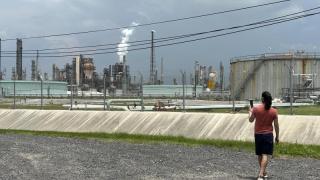As I think about the significance of Earth Day, I reflect on how much has changed since the start of the modern environmental movement. Nowadays, the concept of environmental justice is well-known in public discourse, but that wasn’t always the case. I only first learned about the environmental justice movement in college, after seeing the neighborhood where my family grew up become one of several communities in Southern California where researchers were studying the disproportionate health impacts of air pollution on communities of color.
That experience opened my eyes to the fact that frontline communities in the US, and globally, have similar stories when it comes to resistance against over-pollution, resource extraction, and economic disinvestment.
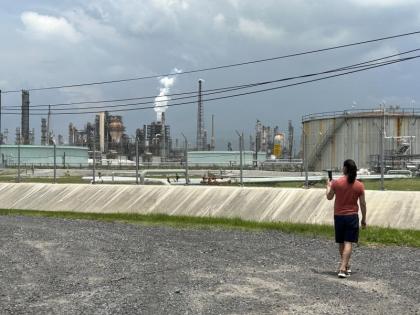
Industrial zone in Louisiana.
Those learnings drove me to pursue environmental justice as a career path, and today, I bring these perspectives with me in my role as a partner to and steward of resources for frontline environmental justice communities. Even though environmental justice has become more mainstream, many communities are still facing the same challenges as when these issues came to light nationally in the early 1980s.
Philanthropic funding for environmental justice issues has increased within the last decade, as evidenced by EGA’s latest Tracking the Field Vol. 8 report, but frontline-led environmental and climate justice groups continue to garner less resources and have lower organizational budgets than larger environmental organizations. The progress is notable, but as funders, we have more work to do.
Historically, environmental justice has been left out of environmental conversations and because of this, it hasn’t always been part of Earth Day celebrations. As we recognize Earth Day this year, it’s important for me to shine a light on these issues, and I believe it’s critical that we continue to do so. I’m heartened that EGA’s Racial Equity POV is creating a pathway for implementing racial equity and justice into our environmental and philanthropy work. The POV has helped make us, as funders, more aware of the complexities within our practices and the environmental field as a whole, while guiding us to lean into the conflicts embedded in our sector and direct our attention to the experiences and wisdom of frontline leadership.
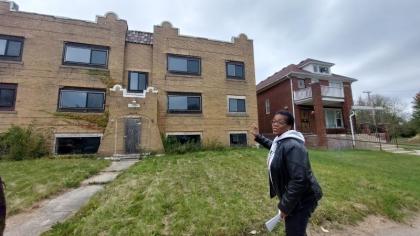
A Builder’s Initiative grantee: HOPE Village Revitalization in Detroit.
As a program officer for Climate Equity at Builders Initiative, my role focuses on advancing and resourcing frontline-led climate and environmental justice solutions in America’s heartland. Our program prioritizes funding for community-based organizations, and their partners, who are building power, growing an equitable clean energy economy, and facilitating a just transition in environmental justice communities.
One of the biggest opportunities where we see this work converging is around efforts to decarbonize residential and commercial buildings in frontline communities. Buildings have an outsized role in emitting greenhouse gas emissions in the Midwest. Decarbonizing buildings can create wealth-building opportunities for residents and workers, remove fossil fuels from homes, and reduce energy poverty. Several of our partners are creating structures that place the people most impacted by the climate crisis at the helm of designing, maintaining, and financing their own clean energy systems, such as community solar programs or geothermal heat pumps. These initiatives, and countless others that we support, embody what it looks like to implement equity and justice in the environmental field.
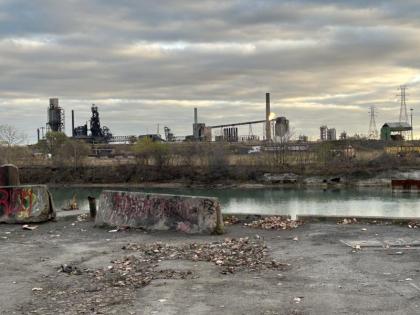
Southwest Detroit
Addressing the climate crisis will require all of us to come together in this fight, and philanthropy must be ready to adequately support communities that are creating just solutions to sustain people and planet for generations to come.
This Earth Day, I invite my colleagues in environmental and climate philanthropy to join me in shifting more resources to environmental justice communities and embracing the principles set forth in EGA’s Racial Equity POV.
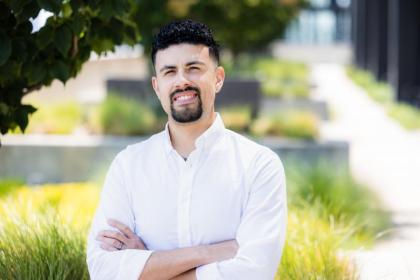
Gabriel Jones is a Program Officer on Builders Initiative's Climate Equity team. He supports grantmaking strategies for environmental justice organizations that are focused on addressing inequities in frontline communities. Gabriel first entered the field of environmental philanthropy while working at the Environmental Grantmakers Association (EGA), and was a fellow in the Environmental Fellows Program. He was recently featured on a panel at EGA's 2024 Winter Briefing workshop, “Grantmaking for Advocacy.”
